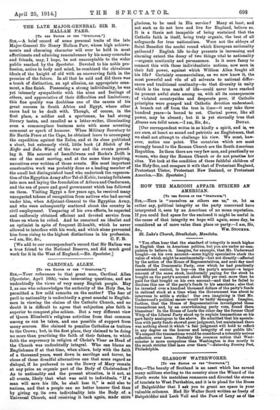CARDINAL ALLEN.
[To ray Maros or TH. Brat-FASO.."] Sia,—Your references to that great man, Cardinal Allen (Spectator, April 18th), -raise interesting questions, and are undoubtedly the views of very many English people. May I, as one who acknowledges the authority of the Holy See, be permitted a few mild remarks on the matter P The fear of peril to nationality is undoubtedly a great scandal to English- men in viewing the claims of the Catholic Church, and no doubt it is difficult to agree that subjection plus faith is superior to conquest plus schism. But a very different view of Queen Elizabeth's religions activities from that common among us can be taken, and one possible of support from many sources. She claimed to penalize Catholics as traitors to the Crown; but, in the first place, they claimed to be doing no more than practising the faith of their fathers, to which faith the supremacy in religion of Christ's Vicar as Head of the Church was undoubtedly integral. Who can blame an Englishman if at that time, when altars, holy with the faith of a thousand years, went down in sacrilege and terror, he chose of those dreadful alternatives one that some regard as disloyal, if he preferred to see the Dowry of Mary remain at any price an organic part of the Body of Christendom P As to nationality and the present situation, is it not, at all events, likely that what was said to individuals, "If a man will save his life, he shall lose it," is said also to nations, and that a people can no better honour God than by giving up its own individuality into the Body of a Universal Church, and receiving it back again, made- more glorious, to be used in His service P Many at least, and not such as do not love and live for England, believe so. It is a thesis not incapable of being sustained that the Catholic faith is itself, being truly organic, the best of all safeguards for true nationalism. Were not the abbeys of Saint Benedict the nuclei round which European nationality gathered? English life to-day presents in increasing and alarming extent the decay of two things vital to nationality —organic continuity and permanence. Is it mere fancy to connect this with those individualistic notions, now seen in their full power, against which William Allen fought all his life ? Certainly commercialism, as we now know it, the most powerful and vile of all solvents to national differ- ences and traditional continuity—to that diversity in unity which is the true mark of life—could never have reached its present awful state among us, with all its consequences of violated countrysides and desperate poor, if Catholic principles were grasped 'and Catholic devotion understood. A branch cut off from the tree in time—it may take three hundred years—is bound to rot. Clerical power, like all power, may be abused ; but it is yet eternally true that Abusus non total usum.—I am, Sir, ice., Donal.
[Our correspondent writes in so kindly a spirit, and is, we are sure, at heart so sound and patriotic an Englishman, that we shall not attempt to challenge his view. We must, how- ever, notice one point. The countries which are most strongly bound to the Roman Church are the South American Republics. In them there are very few men, and practically no women, who deny the Roman Church or do not practise her rites. Yet look at the condition of these faithful children of the Holy See, and compare it with that of Protestant England, Protestant Ulster, Protestant New Zealand, or Protestant America.—En. Spectator.]


























































 Previous page
Previous page